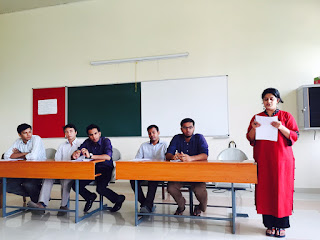The
Rural exposure visit for MA Applied Sociology students took place on 26th
and 27th of June. We were a batch of more than 40 students along
with teachers. We visited villages in the Hoskote Taluk which belongs to the
Bangalore Rural district. Our visit was planned and organized meticulously by
Centre for Social Action – Christ University.
We
were provided stay in the CSA dormitories. The village visit was an eye opener
in many sorts. We started off with an enlightening interaction with one of the
pioneers of this social change Mrs.Shakuntala from Appasandra. We had six
translators to assist while this interactive session was going on. It was a
riveting experience. We heard about the transformational journey the villages
had undergone with the help of CSA. They explained how the whole project took
off in 2003.
A
very humble beginning, filled with many a troubles and challenges. CSA first
began with the Nutrition of Children. CSA had a preliminary report with pointed
towards the massive malnutrition trends in this region. Gradually with
procurement of the nutritious food, the weight of the kids increased
substantially and was there for everyone to see. This in a way reduced the
slight inhibitions the villagers had towards the “Christ” tag. Soon, CSA was
involved in assisting education for these kids. They were convincing their
parents and getting them into schools, reducing dropouts, spreading awareness
of a quality education and reaps of reward awaiting them in future.
Mrs.Shakuntala
also spoke about the Self-Help groups, which has been the backbone of the
village development from last one decade. There are more than 15 SHGs which
meet up regularly. It enables crowd saving and this money would then be
diverted to savings bank account. Later when a need arises , the loan from this
amount is granted to a member. There are also cluster groups which provide
money only for the income generating activities. It started off with an initial
seed amount of 25 lakh rupees. And today the village can boast of a turnover of
18 crores. Most of the households are financially stable and settling into safe
courtyards.
We
also had the opportunity to visit the Government School in Appasandra village.
The experience was an eye opener for all the privileges we enjoy. Cause the
situation cried for more assistance and help. The school taught from 1st
to 5th std. But it had only two classes. This meant many classes had
to be combined and with only two teachers, most often this combination made all
classes look same. The headmaster told us about the lack of government support,
how just 92 paise was allotted to each kid for a month. And also how irregular
and irresponsible it was when the paying heed to the concerns and cries of the
school. With the whole country chanting about “Swachh Bharat”, many of these
schools do not have proper washroom facilities. In Appasandra, there are no
water facilities. A kid has to draw water from a distance and travel to use
washroom. We spoke to the kids and taught them few of what we knew. We also
used flashcards to have an interactive session. The enthusiasm and exuberance
the kids’ exhibit is tremendous and keeps our faith intact in the potential. We
also had house and farm visits which enabled us get firsthand experience about the
lifestyle and operations of SHGs.
On the last day, we had a community program where we painted the walls of their school with educational themes. We also had a reflection session, where our mutual experiences were shared and suggestions were made. To top it all, all groups sang a local folk song to appreciate and nurture the local tradition. Overall, it was an eye opener and a fruitful visit, which will help us take our future as sociologists in the right path.
Prajwal, MA Applied Sociology



























